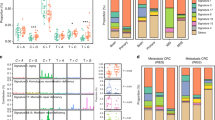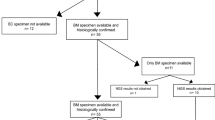Abstract
Purpose
Leptomeningeal metastasis (LM) is a complication of surgery for brain metastasis and is a risk factor of poor prognosis. The risk of LM is particularly high after surgery for a breast cancer metastasis to the brain. If the risk of LM after surgical resection for a brain metastasis were predictable, appropriate adjuvant therapy could be administered to individual patients to improve their prognosis. The present study aimed to reveal the genetic characteristics of brain metastases as means of predicting LM in breast cancer patients.
Methods
Ten patients with brain metastases of breast cancer presented LM after surgical resection were analyzed by whole-exome sequencing.
Results
A chromodomain-helicase-DNA-binding protein 5 (CHD5) gene alteration was detected in nine cases (90%), including a nonsynonymous variant in four cases and copy number deletion in five cases. CHD5 protein expression was lost in nine cases and had decreased in one case. The frequency of CHD5 gene alteration in brain metastases with LM was significantly higher than in primary breast cancer (2.3%) or in brain metastases of breast cancer (0%) (p < 0.0001).
Conclusions
These results suggested that the CHD5 gene alteration was associated with LM after surgical resection of breast cancer brain metastases. Searching for the gene alteration might predict the LM risk after surgical resection.

Similar content being viewed by others
Data Availability
The datasets analyzed during the current study are available from the corresponding author on reasonable request.
Code Availability
Not applicable.
References
Le Rhun E, Weller M, Brandsma D, Van den Bent M, de Azambuja E, Henriksson R, Boulanger T, Peters S, Watts C, Wick W, Wesseling P, Ruda R, Preusser M, Board EE, Committee EG (2017) EANO-ESMO clinical practice guidelines for diagnosis, treatment and follow-up of patients with leptomeningeal metastasis from solid tumours. Ann Oncol 28:iv84–iv. https://doi.org/10.1093/annonc/mdx221
Scott BJ, Oberheim-Bush NA, Kesari S (2016) Leptomeningeal metastasis in breast cancer - a systematic review. Oncotarget 7:3740–3747. https://doi.org/10.18632/oncotarget.5911
Tewarie IA, Jessurun CAC, Hulsbergen AFC, Smith TR, Mekary RA, Broekman MLD (2021) Leptomeningeal disease in neurosurgical brain metastases patients: a systematic review and meta-analysis. Neurooncol Adv 3:vdab162. https://doi.org/10.1093/noajnl/vdab162
Ilic I, Faron A, Heimann M, Potthoff AL, Schafer N, Bode C, Borger V, Eichhorn L, Giordano FA, Guresir E, Jacobs AH, Ko YD, Landsberg J, Lehmann F, Radbruch A, Herrlinger U, Vatter H, Schuss P, Schneider M (2021) Combined Assessment of Preoperative Frailty and Sarcopenia allows the prediction of overall survival in patients with Lung Cancer (NSCLC) and surgically treated Brain Metastasis. Cancers (Basel) 13. https://doi.org/10.3390/cancers13133353
Prabhu RS, Turner BE, Asher AL, Marcrom SR, Fiveash JB, Foreman PM, Press RH, Patel KR, Curran WJ, Breen WG, Brown PD, Jethwa KR, Grills IS, Arden JD, Foster LM, Manning MA, Stern JD, Soltys SG, Burri SH (2019) A multi-institutional analysis of presentation and outcomes for leptomeningeal disease recurrence after surgical resection and radiosurgery for brain metastases. Neuro Oncol 21:1049–1059. https://doi.org/10.1093/neuonc/noz049
Mahajan A, Ahmed S, McAleer MF, Weinberg JS, Li J, Brown P, Settle S, Prabhu SS, Lang FF, Levine N, McGovern S, Sulman E, McCutcheon IE, Azeem S, Cahill D, Tatsui C, Heimberger AB, Ferguson S, Ghia A, Demonte F, Raza S, Guha-Thakurta N, Yang J, Sawaya R, Hess KR, Rao G (2017) Post-operative stereotactic radiosurgery versus observation for completely resected brain metastases: a single-centre, randomised, controlled, phase 3 trial. Lancet Oncol 18:1040–1048. https://doi.org/10.1016/S1470-2045(17)30414-X
Brown PD, Ballman KV, Cerhan JH, Anderson SK, Carrero XW, Whitton AC, Greenspoon J, Parney IF, Laack NNI, Ashman JB, Bahary JP, Hadjipanayis CG, Urbanic JJ, Barker FG 2nd, Farace E, Khuntia D, Giannini C, Buckner JC, Galanis E, Roberge D (2017) Postoperative stereotactic radiosurgery compared with whole brain radiotherapy for resected metastatic brain disease (NCCTG N107C/CEC.3): a multicentre, randomised, controlled, phase 3 trial. Lancet Oncol 18:1049–1060. https://doi.org/10.1016/S1470-2045(17)30441-2
Sadato D, Hirama C, Kaiho-Soma A, Yamaguchi A, Kogure H, Takakuwa S, Ogawa M, Doki N, Ohashi K, Harada H, Oboki K, Harada Y (2021) Archival bone marrow smears are useful in targeted next-generation sequencing for diagnosing myeloid neoplasms. PLoS ONE 16:e0255257. https://doi.org/10.1371/journal.pone.0255257
McKenna A, Hanna M, Banks E, Sivachenko A, Cibulskis K, Kernytsky A, Garimella K, Altshuler D, Gabriel S, Daly M, DePristo MA (2010) The genome analysis Toolkit: a MapReduce framework for analyzing next-generation DNA sequencing data. Genome Res 20:1297–1303. https://doi.org/10.1101/gr.107524.110
Cancer Genome Atlas, Research N, Weinstein JN, Collisson EA, Mills GB, Shaw KR, Ozenberger BA, Ellrott K, Shmulevich I, Sander C, Stuart JM (2013) The Cancer Genome Atlas Pan-Cancer analysis project. Nat Genet 45:1113–1120. https://doi.org/10.1038/ng.2764
Li Q, Jiang B, Guo J, Shao H, Del Priore IS, Chang Q, Kudo R, Li Z, Razavi P, Liu B, Boghossian AS, Rees MG, Ronan MM, Roth JA, Donovan KA, Palafox M, Reis-Filho JS, de Stanchina E, Fischer ES, Rosen N, Serra V, Koff A, Chodera JD, Gray NS, Chandarlapaty S (2021) INK4 tumor suppressor proteins mediate resistance to CDK4/6 kinase inhibitors. Cancer Discov https//. https://doi.org/10.1158/2159-8290.CD-20-1726
Morgan AJ, Giannoudis A, Palmieri C (2021) The genomic landscape of breast cancer brain metastases: a systematic review. Lancet Oncol 22:e7–e. https://doi.org/10.1016/S1470-2045(20)30556-8
Kolla V, Zhuang T, Higashi M, Naraparaju K, Brodeur GM (2014) Role of CHD5 in human cancers: 10 years later. Cancer Res 74:652–658. https://doi.org/10.1158/0008-5472.CAN-13-3056
Wu X, Zhu Z, Li W, Fu X, Su D, Fu L, Zhang Z, Luo A, Sun X, Fu L, Dong JT (2012) Chromodomain helicase DNA binding protein 5 plays a tumor suppressor role in human breast cancer. Breast Cancer Res 14:R73. https://doi.org/10.1186/bcr3182
Adzhubei IA, Schmidt S, Peshkin L, Ramensky VE, Gerasimova A, Bork P, Kondrashov AS, Sunyaev SR (2010) A method and server for predicting damaging missense mutations. Nat Methods 7:248–249. https://doi.org/10.1038/nmeth0410-248
Naraparaju K, Kolla V, Zhuang T, Higashi M, Iyer R, Kolla S, Okawa ER, Blobel GA, Brodeur GM (2016) Role of microRNAs in epigenetic silencing of the CHD5 tumor suppressor gene in neuroblastomas. Oncotarget 7:15977–15985. https://doi.org/10.18632/oncotarget.7434
Berx G, Cleton-Jansen AM, Nollet F, de Leeuw WJ, van de Vijver M, Cornelisse C, van Roy F (1995) E-cadherin is a tumour/invasion suppressor gene mutated in human lobular breast cancers. EMBO J 14:6107–6115
Vos CB, Cleton-Jansen AM, Berx G, de Leeuw WJ, ter, Haar NT, van Roy F, Cornelisse CJ, Peterse JL, van de Vijver MJ (1997) E-cadherin inactivation in lobular carcinoma in situ of the breast: an early event in tumorigenesis. Br J Cancer 76: 1131–1133 https://doi.org/10.1038/bjc.1997.523
Lee S, Ahn HK, Park YH, Nam DH, Lee JI, Park W, Choi DH, Huh SJ, Park KT, Ahn JS, Im YH (2011) Leptomeningeal metastases from breast cancer: intrinsic subtypes may affect unique clinical manifestations. Breast Cancer Res Treat 129:809–817. https://doi.org/10.1007/s10549-011-1682-0
Lin NU, Vanderplas A, Hughes ME, Theriault RL, Edge SB, Wong YN, Blayney DW, Niland JC, Winer EP, Weeks JC (2012) Clinicopathologic features, patterns of recurrence, and survival among women with triple-negative breast cancer in the National Comprehensive Cancer Network. Cancer 118:5463–5472. https://doi.org/10.1002/cncr.27581
Morikawa A, Jordan L, Rozner R, Patil S, Boire A, Pentsova E, Seidman AD (2017) Characteristics and outcomes of patients with breast Cancer with Leptomeningeal Metastasis. Clin Breast Cancer 17:23–28. https://doi.org/10.1016/j.clbc.2016.07.002
Acknowledgements
We are grateful to the patients for donating their tissue to research.
Funding
This study was supported by the Clinical Research Fund of the Tokyo Metropolitan Government (R030303007).
Author information
Authors and Affiliations
Contributions
Designed and performed the study: R.O. Sample correction: R.O., R.Y., H.Y. Analysis and interpretation of whole exome sequence data: D.S., R.O. Manuscript: R.O., D.S. Review and discussion of the manuscript: all the authors.
Corresponding author
Ethics declarations
Ethics approval
The present study was approved by the ethics committee at Tokyo Metropolitan Komagome Hospital (No. 2631).
Consent to participate
Written informed consent was obtained from all individual participants included in the study.
Consent for publication
Patients signed informed consent regarding publishing their data.
Conflicts of Interest/Competing interests
The authors declare that they have no competing interests.
Additional information
Publisher’s Note
Springer Nature remains neutral with regard to jurisdictional claims in published maps and institutional affiliations.
Electronic supplementary material
Below is the link to the electronic supplementary material.
11060_2023_4381_MOESM1_ESM.docx
Supplementary Table S1. All pathogenic variants detected in ten cases of breast cancer-related brain metastases with leptomeningeal metastasis after surgical resection. VAF, Variant allele frequency.
11060_2023_4381_MOESM2_ESM.docx
Supplementary Table S2. Frequency of CHD5 gene variants in brain metastases and primary lesions of various cancer types other than breast cancer in the TCGA data.
11060_2023_4381_MOESM3_ESM.tif
Supplementary Figure S1. Immunohistochemical staining of the CHD5 protein in all the samples of breast cancer-related brain metastasis with leptomeningeal metastasis in the present study. The positive control is also shown.
Rights and permissions
Springer Nature or its licensor (e.g. a society or other partner) holds exclusive rights to this article under a publishing agreement with the author(s) or other rightsholder(s); author self-archiving of the accepted manuscript version of this article is solely governed by the terms of such publishing agreement and applicable law.
About this article
Cite this article
Otani, R., Sadato, D., Yamada, R. et al. CHD5 gene variant predicts leptomeningeal metastasis after surgical resection of brain metastases of breast cancer. J Neurooncol 163, 657–662 (2023). https://doi.org/10.1007/s11060-023-04381-9
Received:
Accepted:
Published:
Issue Date:
DOI: https://doi.org/10.1007/s11060-023-04381-9




